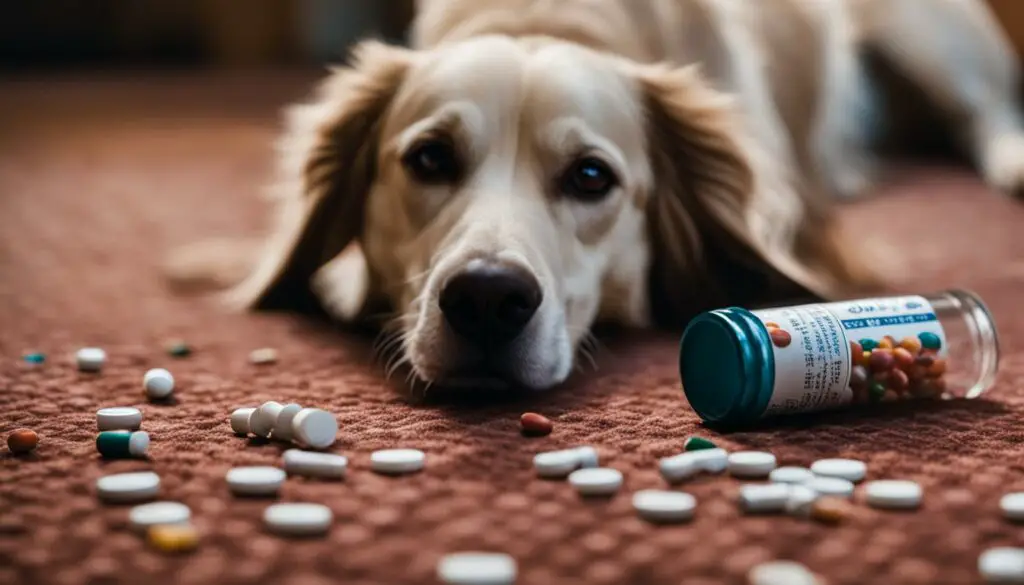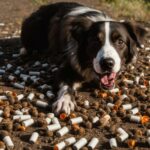If your dog has ingested medication intended for another dog, it can be a cause for concern. Acting quickly and taking appropriate steps is crucial in such situations. Whether you have immediate access to a veterinarian or not, there are steps you can take to ensure your dog’s well-being.
Key Takeaways:
- Accidental ingestion of medication can happen among dogs.
- Acting quickly and seeking veterinary care is essential.
- Calling a poison control hotline for dogs can provide helpful guidance.
- Inducing vomiting or administering activated charcoal may be recommended.
- Proper diagnosis and treatment are crucial for your dog’s recovery.
Calling a Poison Control Hotline for Dogs
If you find yourself in a situation where your dog has ingested medication intended for another dog and you do not have immediate access to a veterinarian, contacting a poison control hotline for dogs can be a valuable first step. These hotlines are staffed by experts who can provide guidance and advice on what to do next.
When calling the poison control hotline, be prepared to provide accurate information about the medication ingested, including the type of drug, dosage, and timing. This will help the operator assess the situation and provide appropriate recommendations. They might advise inducing vomiting or giving activated charcoal to limit the absorption of the medication. It is important to follow their instructions carefully.
While the poison control hotline can provide initial guidance, it is crucial to seek emergency veterinary care for your dog. The hotline experts can give you advice on what to do at home, but a veterinarian will be able to provide the necessary medical treatment and monitor your dog’s condition. Remember, time is of the essence in these situations, so act quickly to ensure the best possible outcome for your furry friend.
Calling a Poison Control Hotline for Dogs
If you do not have immediate access to a veterinarian, contacting a poison control hotline for dogs is a valuable first step. Provide the operator with accurate information about the medication ingested, including the type of drug, dosage, and timing. They may instruct you to induce vomiting or give activated charcoal to limit absorption. Following their advice and seeking emergency veterinary care is essential to ensure your dog’s well-being.
Inducing Vomiting and Administering Activated Charcoal
If your dog has ingested medication intended for another dog, it is important to act quickly. In some cases, a veterinarian or poison control expert may recommend inducing vomiting in your dog. This can be done using hydrogen peroxide or other methods under their guidance. The objective is to remove the ingested medication from your dog’s system before it can be absorbed and cause harm.
Administering activated charcoal is another common treatment for dogs who have ingested medication. Activated charcoal binds to the drug in the gastrointestinal tract and helps prevent its absorption. It is a safe and effective way to reduce the potential harm caused by the medication. The dosage of activated charcoal will depend on the characteristics of the drug your dog ingested.
It is important to note that inducing vomiting and administering activated charcoal should only be done under the guidance of a veterinarian or poison control expert. They will be able to assess the situation and provide specific instructions based on your dog’s health and the medication involved. Seeking professional advice is crucial to ensure the well-being of your furry friend.
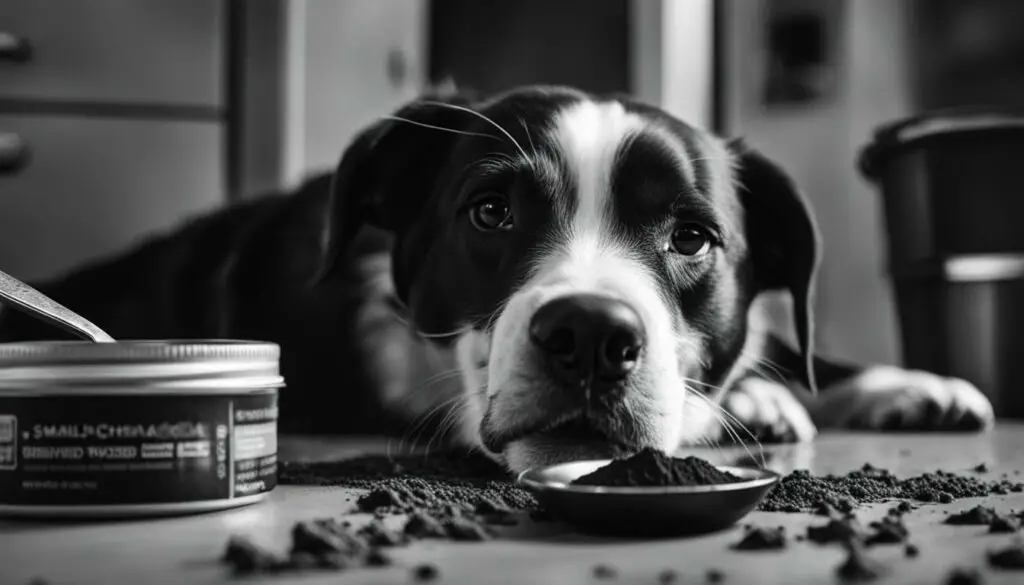
Risks and Precautions
While inducing vomiting and administering activated charcoal can be beneficial in certain situations, there are risks and precautions to consider. For example, not all medications are safe to induce vomiting for, and some drugs may have already been absorbed into the bloodstream by the time the dog is brought in for treatment. It is important to follow the guidance of a veterinary professional to determine the best course of action.
Emergency Veterinary Treatment
When a dog ingests medication intended for another dog, immediate veterinary treatment is crucial to prevent any potential harm. Emergency veterinary care is necessary to minimize the risk of poisoning and ensure the well-being of your pet.
Upon arrival at the veterinary hospital, the veterinarian may induce vomiting or perform stomach pumping to limit further absorption of the ingested medication. This is done to remove the harmful substances from the dog’s system. Activated charcoal is often administered as well. It binds to the drug in the gastrointestinal tract and aids in its elimination.
Fluid therapy is also provided to maintain blood pressure and assist in flushing out the system. Additionally, the dog may receive medications to support heart and respiratory function. In cases where the medication ingested affects the central nervous system, seizure and agitation control may be necessary.
As the treatment progresses, the dog’s vital signs are closely monitored to ensure complete recovery. Extended hospitalization may be required until the dog is stable and no longer at risk of complications.
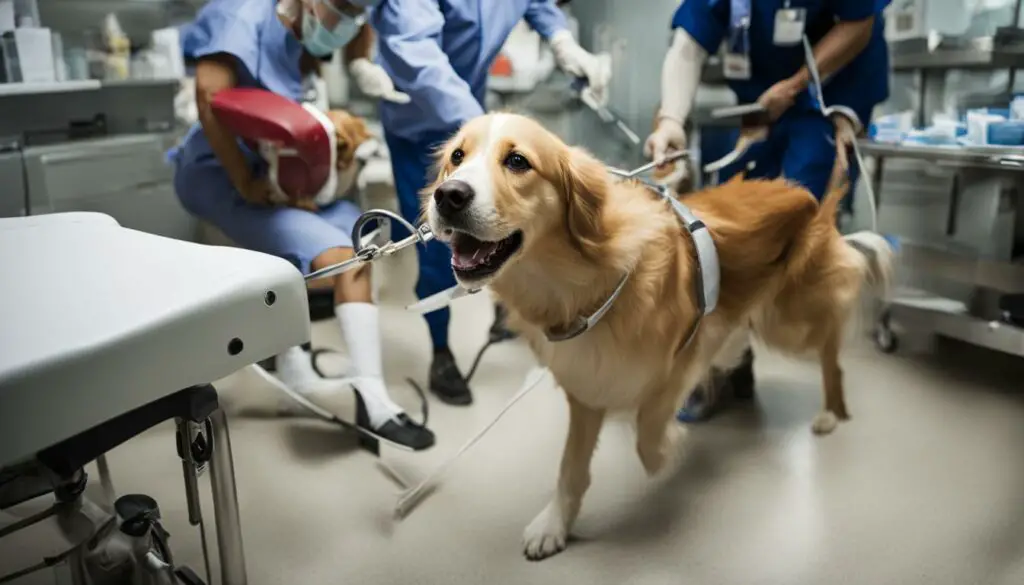
Table: Emergency Veterinary Treatment
| Treatment | Description |
|---|---|
| Inducing vomiting | The veterinarian may induce vomiting to remove the ingested medication from the dog’s system |
| Stomach pumping | If necessary, the veterinarian may perform stomach pumping to further prevent absorption |
| Activated charcoal | Administered to bind the drug in the gastrointestinal tract and aid in its elimination |
| Fluid therapy | Provided to maintain blood pressure and flush out the system |
| Medications for heart and respiratory support | Given to support heart and respiratory function, especially if the medication affects these systems |
| Seizure and agitation control | If the medication ingested affects the central nervous system, medications are administered to control seizures and agitation |
| Vital sign monitoring | The dog’s vital signs are closely monitored throughout the treatment process |
Dogs and Accidental Medication Ingestion
Dogs are curious by nature, and it’s not uncommon for them to accidentally ingest human medication. This can happen when medications are left within their reach, such as on nightstands, kitchen counters, or in bathrooms. While some medications may be harmless to dogs, others can pose serious risks to their health.
It is important to understand the dangers of medication ingestion in dogs. Many human medications can have toxic effects on dogs, causing symptoms such as vomiting, diarrhea, lethargy, seizures, and even organ damage. Certain medications, like NSAIDs (non-steroidal anti-inflammatory drugs) and acetaminophen, can be particularly harmful to dogs.
To prevent accidental medication ingestion, it is crucial to keep all medications securely stored and out of your dog’s reach. If you suspect that your dog has consumed human medication, it is essential to seek prompt veterinary care. Bringing the original medication container to the veterinarian can help them diagnose the situation accurately and provide the appropriate treatment.
| Types of Medications | Dangers to Dogs |
|---|---|
| NSAIDs (e.g., ibuprofen, naproxen) | Gastrointestinal irritation, ulcers, kidney damage |
| Acetaminophen | Liver failure |
| Antidepressants | Increased heart rate, seizures, tremors |
“Accidental ingestion of human medication can have serious consequences for dogs’ health. It is important to prevent access to medications and seek immediate veterinary care if ingestion occurs.” – Dr. Sarah Thompson, DVM
If your dog ingests human medication, do not attempt to induce vomiting or provide any home remedies without consulting a veterinarian first. The appropriate treatment depends on the specific medication ingested and the dosage. Only a qualified veterinarian can provide the necessary guidance and care to ensure your dog’s well-being.
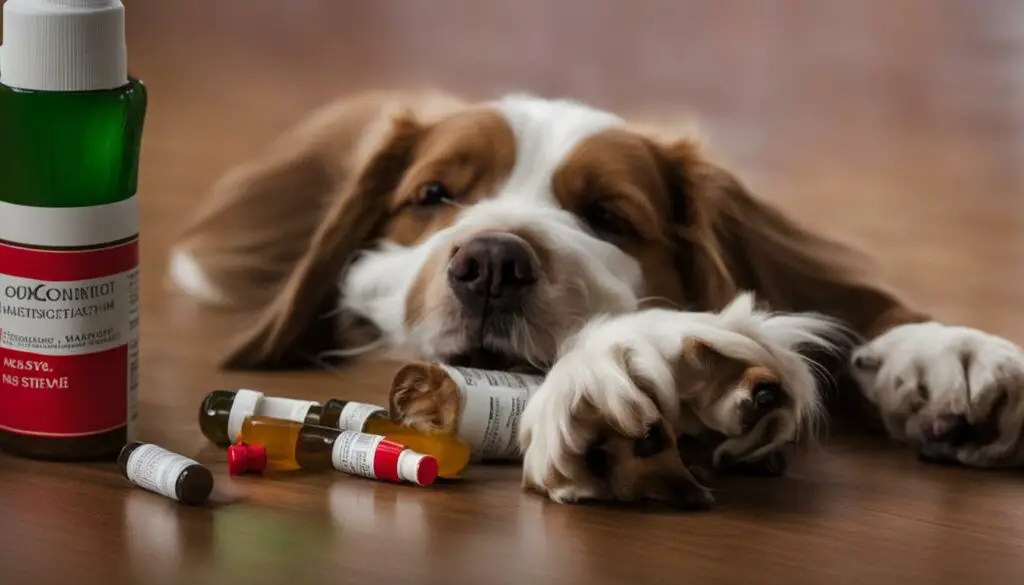
Takeaways:
- Dogs can accidentally ingest human medication when it is within their reach.
- Many human medications can be toxic to dogs and cause serious health issues.
- Prevention is key: store medications securely and out of your dog’s reach.
- If your dog ingests human medication, seek immediate veterinary care and bring the original container for accurate diagnosis.
Dangerous Drugs for Dogs
When it comes to the health and well-being of our furry friends, it is important to be aware of the potential dangers that certain human medications can pose to dogs. While these medications may be safe for humans, they can be highly toxic to our canine companions.
NSAIDs
Non-steroidal anti-inflammatory drugs (NSAIDs) are commonly used to relieve pain and reduce inflammation in humans. However, they can cause serious harm to dogs. NSAIDs such as aspirin, ibuprofen, naproxen, and indomethacin can cause gastrointestinal irritation and damage. Ingestion of these medications can lead to stomach ulcers, kidney damage, and even death.
Acetaminophen
Acetaminophen, commonly known as Tylenol, is a popular over-the-counter medication used to relieve pain and reduce fever in humans. However, it can be extremely toxic to dogs. Ingestion of acetaminophen can cause liver failure, which can be fatal for our canine companions. It is important to keep all medications containing acetaminophen out of the reach of dogs.
ADHD Medications
ADHD medications containing amphetamine are potent stimulants that can be life-threatening when ingested by dogs. These medications can cause elevated heart rate, increased blood pressure, and seizures in dogs. It is essential to keep these medications securely stored and out of reach to prevent accidental ingestion.
Other medications such as blood pressure medications and sleep medications can also pose risks to dogs’ health. It is important to consult with a veterinarian before giving your dog any medication intended for human use. They can provide guidance on safe alternatives and proper dosages for your furry friend.
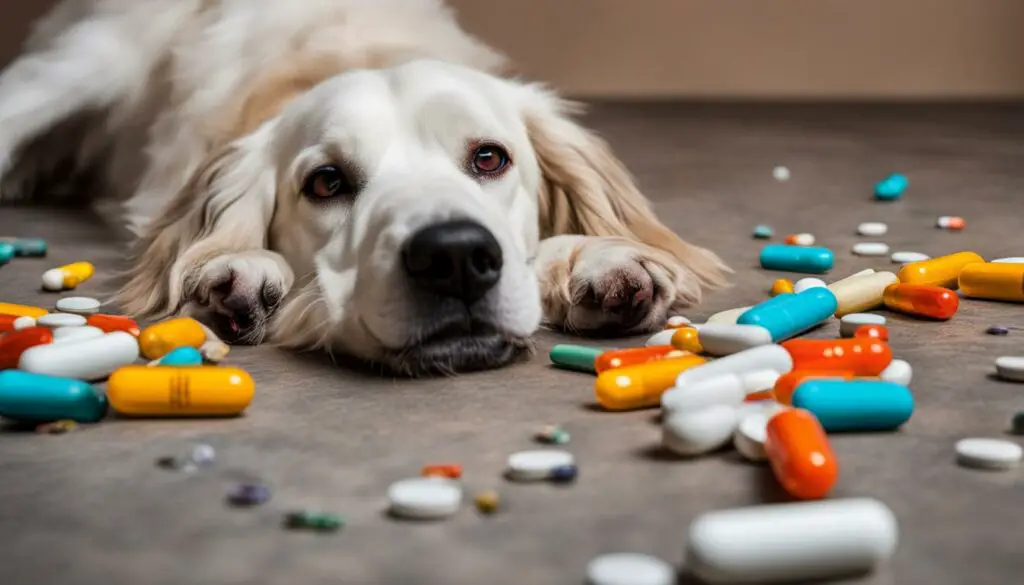
| Medication | Potential Risks |
|---|---|
| NSAIDs (aspirin, ibuprofen, naproxen, indomethacin) | Gastrointestinal irritation, ulcers, kidney damage |
| Acetaminophen (Tylenol) | Liver failure |
| ADHD medications (containing amphetamine) | Elevated heart rate, increased blood pressure, seizures |
| Blood pressure medications | Variable effects, consult a veterinarian for guidance |
| Sleep medications | Variable effects, consult a veterinarian for guidance |
It is crucial to take precautions to ensure the safety of our furry friends. Keep all medications securely stored and out of reach of dogs. If you suspect that your dog has ingested any medication intended for human use, contact your veterinarian immediately. They can provide guidance on the best course of action and administer the necessary treatments to protect your dog’s health.
Treatment for Accidental Medication Intoxication
Accidental medication ingestion in dogs can occur more frequently than we realize. When it happens, it is important to take immediate action and seek emergency veterinary care. The treatment for accidental medication intoxication in dogs may vary based on the specific situation, but there are some general interventions that can be crucial in ensuring the well-being of your furry friend.
Inducing vomiting is a common initial step to remove the ingested medication from the stomach. This can be done under the guidance of a veterinarian or a poison control expert. It is important to note that inducing vomiting is only recommended in certain cases and should not be attempted without professional advice, as it can be harmful if done incorrectly.
In some instances, administering activated charcoal may be recommended. Activated charcoal helps prevent the absorption of the ingested medication by binding to it in the gastrointestinal tract. This can limit the potential harm caused by the medication. However, it is crucial to follow the instructions provided by a veterinarian or a poison control expert regarding the appropriate dosage and timing of activated charcoal administration.
It is important to remember that each case of accidental medication ingestion in dogs is unique, and the treatment may vary accordingly. Promptly contacting a veterinarian or the ASPCA Pet Poison Line can provide you with expert guidance tailored to your dog’s specific situation. They can advise on the necessary steps to take and any additional interventions that may be required.
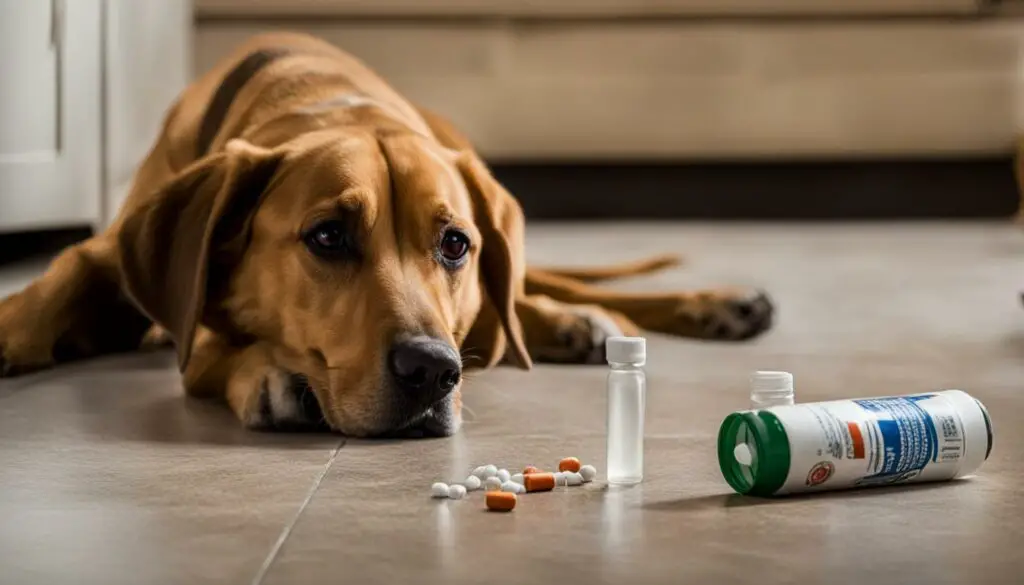
| Treatment Options for Accidental Medication Intoxication in Dogs | Advantages | Considerations |
|---|---|---|
| Inducing Vomiting | – Removes ingested medication from the stomach – Can prevent further absorption |
– Should only be done under professional guidance – Not suitable for all cases |
| Administering Activated Charcoal | – Binds to medication in the gastrointestinal tract – Reduces absorption |
– Dosage and timing must be followed accurately – Not effective for all medications |
| Seeking Veterinary Care | – Access to professional expertise – Tailored treatment options |
– Prompt action is crucial – Treatment may vary depending on the case |
“Accidental medication intoxication in dogs requires prompt medical intervention. Seeking immediate advice from a veterinarian is crucial.”
Accidental medication ingestion in dogs can be a distressing situation, but with quick action and proper veterinary care, the chances of a positive outcome improve significantly. Remember to always consult with a veterinarian for proper diagnosis and treatment to ensure the well-being of your beloved canine companion.
Foreign Objects Ingestion and Medical Interventions
When dogs ingest foreign objects such as socks, toys, or plastic items, it can lead to serious complications. Immediate veterinary intervention is crucial in these cases to prevent further harm and ensure the well-being of your pet. Depending on the situation, vets may employ various medical interventions to address the issue.
If the ingestion has recently occurred, inducing vomiting may be recommended to try and remove the foreign object from the dog’s system. However, it is important to note that not all objects can be safely removed through vomiting. In some instances, veterinarians may choose to monitor the object’s progression through the intestine, ensuring it passes naturally. If the object becomes lodged or poses a significant risk, surgery may be necessary to remove it.
In cases of fabric ingestion, where items like socks are consumed, there might be underlying gastrointestinal issues or behavioral factors at play. GI specialists suggest that fabric ingestion in dogs should not be taken lightly, as it can lead to serious complications. Monitoring your dog’s behavior and environment, and keeping fabric items out of their reach, can help prevent such incidents.
| Foreign Object | Possible Interventions |
|---|---|
| Socks | Inducing vomiting, monitoring object progression, or surgery |
| Plastic objects | Inducing vomiting, monitoring object progression, or surgery |
| Toys | Inducing vomiting, monitoring object progression, or surgery |
It is important to remember that prevention is key when it comes to foreign object ingestion. Keeping potentially hazardous objects out of your dog’s reach and providing them with appropriate toys and chewables can significantly reduce the risk of ingestion. Regular monitoring of your dog’s behavior and immediate veterinary attention in case of suspicion or ingestion can help ensure their safety and well-being.
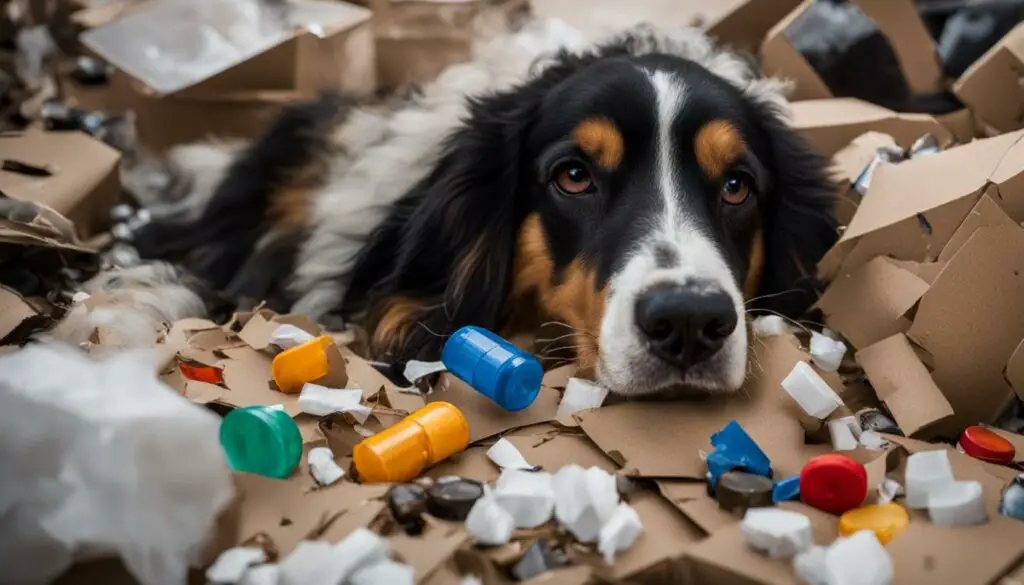
Cautionary Tales
“My dog once swallowed a toy squeaker, and I didn’t realize it until he started showing signs of distress. I rushed him to the vet, and they were able to remove it through surgery. It was a scary experience, but it taught me the importance of keeping small objects out of his reach.”
“My dog has a habit of chewing socks, and one time he ended up swallowing one. We induced vomiting at home as advised by the vet, and thankfully, he was able to expel the sock. But it was a wake-up call for me to be more vigilant about what he has access to.”
Dangers of Socks and Other Fabric Items
Dogs have a tendency to chew on various objects, including socks and other fabric items. While it may seem harmless at first, this behavior can actually pose significant dangers to their health. When a dog ingests fabric, especially in large quantities or if the item is obstructive, it can lead to digestive complications and potential blockages in the gastrointestinal tract.
When a fabric item becomes lodged in the dog’s digestive system, it cannot be broken down like natural materials. This can result in a complete obstruction, preventing the passage of food and fluids. In such cases, prompt intervention is necessary to avoid more serious complications, such as perforation or damage to the intestine.
Endoscopy or surgery may be required to remove the fabric object from the dog’s digestive system. This invasive procedure can be costly and requires a significant recovery period. It is essential to keep fabric items out of your dog’s reach to prevent accidental ingestion and the associated risks.
Key Takeaways:
- Chewing on socks and other fabric items can be dangerous for dogs.
- Ingesting fabric can lead to digestive complications and potential blockages.
- Prompt intervention, such as endoscopy or surgery, may be necessary to remove fabric objects from the digestive system.
- Preventive measures, such as keeping fabric items out of the dog’s reach, are crucial to avoid accidents and potential health risks.
Dangerous Objects Ingestion Comparison Table
| Object Type | Dangers for Dogs |
|---|---|
| Socks and other fabric items | Risk of digestive complications and potential blockages in the gastrointestinal tract |
| Plastic objects | Choking hazards and potential injuries to the mouth, throat, or esophagus |
| Toxic substances | Poisoning symptoms and potential organ damage depending on the substance ingested |
It is crucial to prioritize the safety of your furry friend by keeping harmful objects out of their reach. Regularly check their surroundings for potential hazards and provide them with safe, durable chew toys instead. By taking preventive measures and being mindful of the objects they interact with, you can help keep your dog happy and healthy.

Risks of Dogs Ingesting Toys or Other Plastic Objects
When it comes to our furry friends, it’s not uncommon for them to be curious about their surroundings and explore objects with their mouths. However, ingesting toys or other plastic objects can pose serious risks to dogs. These items are less malleable than fabric and can become lodged in the mouth, throat, or esophagus, creating a choking hazard. This can be a distressing and potentially life-threatening situation for your beloved pet.
To ensure your dog’s safety, it’s important to supervise them while they chew on toys and keep small objects out of their reach. Prompt intervention is crucial if a dog ingests plastic to prevent complications. If you suspect your dog has ingested a plastic object, it’s essential to seek veterinary care immediately. They can assess the situation and take the necessary steps to ensure your dog’s well-being.

Remember, prevention is key when it comes to protecting your dog from the dangers of ingesting toys or other plastic objects. By providing safe and appropriate toys for your dog, you can minimize the risk of them ingesting harmful materials. Regularly inspecting toys for signs of wear and tear can also help identify potential hazards before they become a problem.
Accidental Ingestion of Toxic Substances
Accidents happen, and it’s not uncommon for dogs to accidentally ingest toxic substances. As responsible pet owners, it’s crucial to be aware of the potential dangers and take immediate action if such an incident occurs. Toxic substances that can be harmful to dogs include raisins, THC products, human pharmaceuticals, mushrooms, and chocolate.
Raisins may seem harmless, but they can cause kidney damage and various symptoms in dogs. THC products, which can be found in cannabis edibles or marijuana, can lead to disorientation, seizures, and other severe effects. Human pharmaceuticals, such as non-steroidal anti-inflammatories, can cause bleeding, ulcers, and even kidney failure in dogs. Mushroom ingestion can result in liver failure and neurotoxicity. Chocolate, a favorite treat for many humans, is toxic to dogs and can cause severe symptoms, including death.
Should your dog accidentally ingest a toxic substance, it is crucial to take prompt action. Contacting a veterinarian or a poison control hotline for guidance is the first step. They can provide specific advice tailored to the substance ingested and recommend appropriate treatments. Remember, time is of the essence, and delaying veterinary care can have serious consequences. Early intervention can make a significant difference in the outcome and help ensure your dog’s well-being.
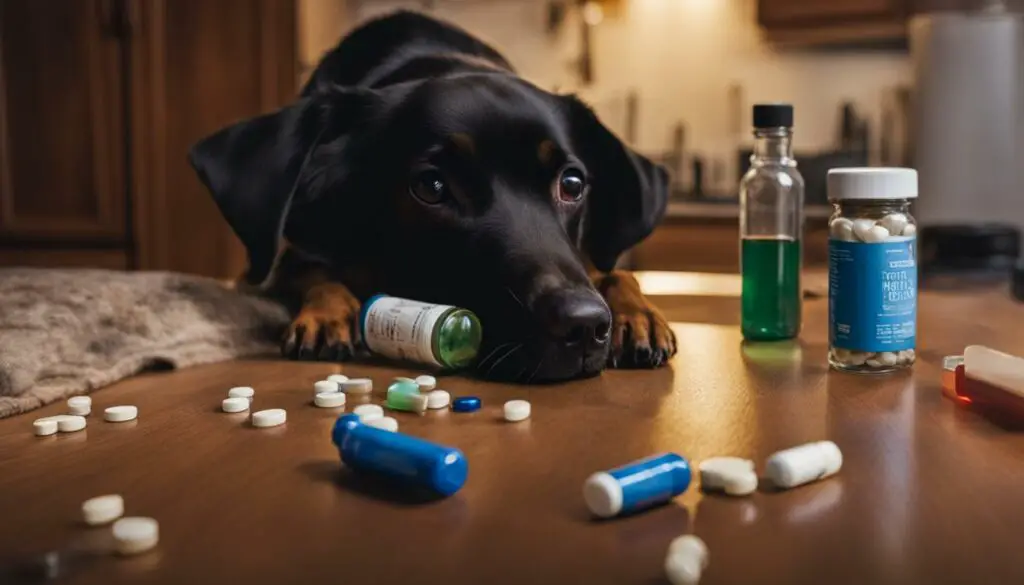
Prompt Action for Accidental Toxic Substance Ingestion
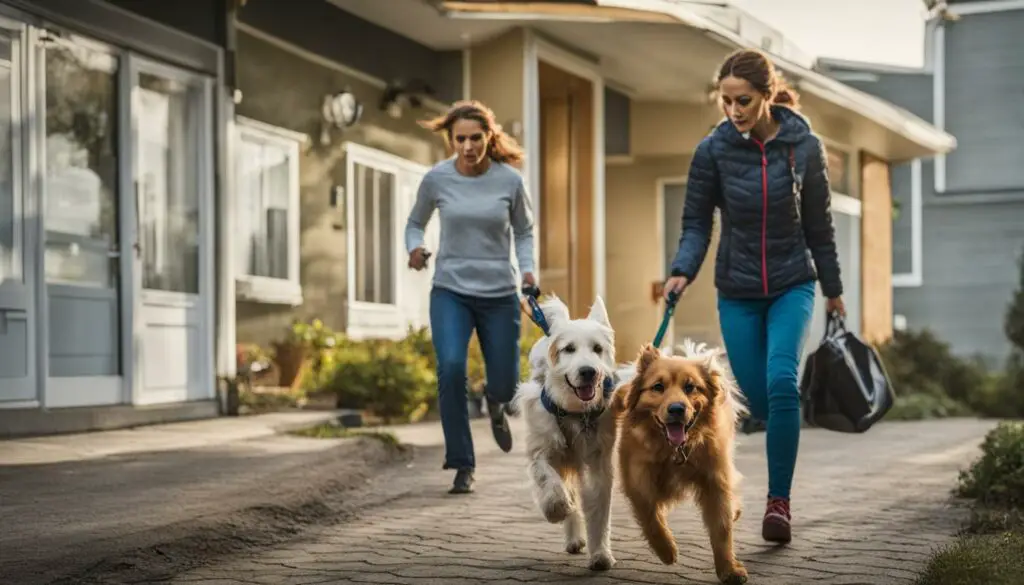
If your dog ingests toxic substances such as raisins, THC products, or other harmful substances, it is crucial to take immediate action. Contact a veterinarian or a poison control hotline for guidance on what steps to take next. They can provide essential advice on how to handle the situation based on the specific substance ingested.
When dealing with accidental ingestion of raisins, for example, the veterinarian may recommend inducing vomiting or administering activated charcoal to prevent absorption. It is important to follow their instructions closely and not delay in seeking professional veterinary care, as raisin ingestion can lead to kidney damage and other severe symptoms.
In the case of THC poisoning in dogs, immediate veterinary intervention is necessary. The veterinarian can assess the severity of the ingestion and advise on appropriate treatment options. They may recommend inducing vomiting or providing specific medications and interventions to counteract the effects of THC. Time is of the essence, as THC can cause disorientation, seizures, and other serious complications in dogs.
Remember, the ingestion of any toxic substance can be life-threatening to your dog. Acting promptly and seeking professional help is the best course of action to ensure your pet’s well-being. By taking immediate action, you can minimize the risks and increase the chances of a positive outcome for your beloved four-legged friend.
Monitoring Yard for Mushroom Growth
When it comes to the safety of our furry friends, we must be vigilant in monitoring their environment, both indoors and outdoors. One potential danger that often goes unnoticed is the presence of toxic mushrooms in our yards. Dogs are known to be curious creatures, and if given the opportunity, they may consume these harmful fungi. It is essential to understand the risks associated with mushroom ingestion in dogs and take proactive measures to prevent any accidents.
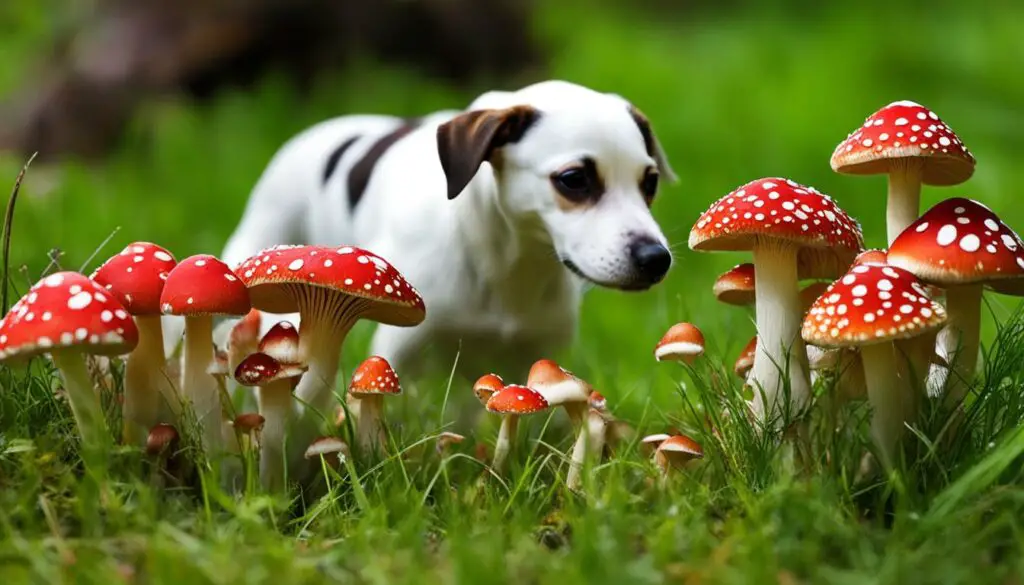
Some mushrooms can be highly toxic to dogs, causing a range of symptoms from gastrointestinal distress to organ failure. To ensure the safety of your furry companion, regularly inspect your yard for any mushroom growth. Pay close attention to shaded areas, damp spots, or areas with decaying organic matter, as these are common environments for mushrooms to thrive.
If you discover any mushrooms in your yard, it is crucial to remove them promptly. Ensure that you wear gloves and use a small shovel or rake to eliminate them, ensuring that all parts of the mushrooms are completely removed, including the root system. Avoid simply plucking the mushroom caps as this may leave behind spores, allowing for future growth.
By monitoring and maintaining a mushroom-free yard, you can significantly reduce the risk of accidental ingestion and potential harm to your beloved pet. Remember, prevention is always better than cure, and a little extra effort in ensuring a safe outdoor environment goes a long way in keeping your furry friend healthy and happy.
The Dangers of Chocolate for Dogs
As a dog owner, it’s important to understand the dangers that certain foods can pose to your furry friend. One such food is chocolate, which can be toxic to dogs. Chocolate contains theobromine, a stimulant that affects a dog’s central nervous system and cardiovascular system. While humans can metabolize theobromine relatively easily, dogs process it much more slowly, making them susceptible to its toxic effects.

The severity of chocolate poisoning in dogs depends on several factors, including the type of chocolate consumed, the amount ingested, and the size of the dog. Dark chocolate and baking chocolate have higher concentrations of theobromine and are therefore more dangerous than milk chocolate. Even a small amount of chocolate can cause digestive issues like vomiting and diarrhea, while larger doses can lead to more severe symptoms such as rapid breathing, increased heart rate, tremors, seizures, and even death.
It is crucial to take immediate action if you suspect your dog has ingested chocolate. Contact the ASPCA Poison Control Hotline or your veterinarian for guidance. They will assess the situation based on factors like the type and amount of chocolate consumed, as well as your dog’s weight and overall health. Depending on the severity of the ingestion, they may recommend inducing vomiting, administering activated charcoal to prevent further absorption, or providing supportive treatments to manage symptoms.
Conclusion
In conclusion, when your dog ingests medication intended for another dog, swift action is crucial. Contacting a poison control hotline for dogs or seeking immediate veterinary care can provide you with the necessary guidance and treatment options. Inducing vomiting and administering activated charcoal are common interventions to prevent absorption of the medication.
It is important to remember that certain human medications can be toxic to dogs, such as NSAIDs, acetaminophen, and ADHD medications. Keeping these medications out of your dog’s reach is essential to prevent accidental ingestion. If your dog consumes human medication, bring the original container to the veterinarian for proper diagnosis and treatment.
Overall, the well-being of your dog should always be a top priority. Prompt action, professional advice, and preventive measures can help ensure their safety. Consult a veterinarian for any concerns, as they are best equipped to provide proper diagnosis, treatment, and guidance.
FAQ
What should I do if my dog ate medication intended for another dog?
If your dog ingests medication intended for another dog, it is important to act quickly. If you have immediate access to a veterinarian, call a poison control hotline for dogs for guidance. If not, contact a poison control hotline for dogs and provide accurate information about the medication ingested. Follow their advice and seek emergency veterinary care.
Can I induce vomiting if my dog ingests medication?
In some cases, a veterinarian or poison control expert may recommend inducing vomiting in your dog. This can be done under their guidance using hydrogen peroxide or other methods. However, it is crucial to seek professional advice before attempting to induce vomiting at home.
What is activated charcoal and how does it help in case of medication ingestion?
Activated charcoal is a common treatment used to prevent absorption of ingested medication. It binds to the drug in the gastrointestinal tract and aids in elimination. Multiple doses may be necessary depending on the drug’s characteristics.
What can I expect during emergency veterinary treatment for medication ingestion?
In cases of recent poisonings, a veterinarian may induce vomiting or perform stomach pumping to limit further absorption. Activated charcoal is often administered to bind the drug and aid in elimination. Fluids may be given to maintain blood pressure and flush out the system. Additional medications may be provided to support heart and respiratory function.
How can I prevent my dog from accidentally ingesting medication?
It is crucial to keep medications out of your dog’s reach to prevent accidental ingestion. Ensure medications are stored in secure areas such as cabinets or drawers. Avoid leaving medications on nightstands, kitchen counters, or in bathrooms where your dog can easily access them.
What human medications are toxic to dogs?
Certain human medications, such as NSAIDs (aspirin, ibuprofen, naproxen, and indomethacin), acetaminophen (Tylenol), ADHD medications containing amphetamine, blood pressure medications, and sleep medications, can be toxic to dogs and pose serious health risks.
What treatments are available for accidental medication intoxication in dogs?
Prompt medical intervention is necessary for accidental medication ingestion in dogs. A veterinarian may recommend inducing vomiting, administering activated charcoal, and providing supportive treatments such as IV fluids and specific medications or antidotes. Most treatments are best performed at a veterinary hospital.
What should I do if my dog ingests foreign objects?
If your dog ingests foreign objects such as socks, toys, or plastic items, immediate veterinary intervention is recommended. The veterinarian may induce vomiting, monitor the object’s progression through the intestine, or perform surgery if necessary to remove the lodged object.
Why is fabric ingestion dangerous for dogs?
Dogs eating socks or other fabric items can lead to digestive complications and potential blockages. Fabric cannot be broken down like natural materials, increasing the risk of obstructions. Endoscopy or surgery may be required for removal.
What risks do plastic objects pose to dogs?
Dogs ingesting toys or other plastic objects can experience choking hazards if the items become lodged in the mouth, throat, or esophagus. It is important to supervise dogs that chew vigorously on toys and keep small objects out of their reach to prevent complications.
What toxic substances are dangerous for dogs?
Dogs can accidentally ingest toxic substances such as raisins, THC products, human pharmaceuticals, mushrooms, and chocolate. These substances can cause various symptoms and serious health issues for dogs.
What action should I take if my dog ingests a toxic substance?
Immediate action is necessary if your dog ingests a toxic substance. Contact a veterinarian or poison control hotline for guidance. They can advise on inducing vomiting or provide specific treatments based on the ingested substance. Seeking professional advice and veterinary care is crucial.
How can I prevent my dog from eating mushrooms?
Monitoring your yard for mushroom growth and removing any mushrooms can help prevent accidental ingestion. If your dog exhibits abnormal symptoms after being outside, such as lethargy, vomiting, or tremors, immediate veterinary attention is necessary.
Why is chocolate dangerous for dogs?
Chocolate contains theobromine, which can be harmful to dogs, especially in larger doses. The concentration of theobromine varies between chocolate varieties. Even small amounts can cause digestive issues, and larger amounts can be fatal. Contact a veterinarian if your dog ingests chocolate to determine the severity and appropriate action.

